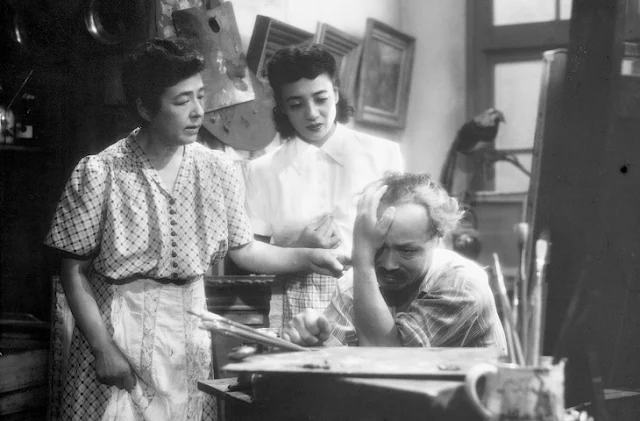 |
| Anouk Aimée in Lola |
Roland Cassard: Marc Michel
Michel: Jacques Harden
Frankie: Alan Scott
Madame Desnoyers: Elina Labourdette
Jeanne, Michel's Mother: Margo Lion
Cécile Desnoyers: Annie Duperoux
Claire, the Bar Owner: Catherine Lutz
Daisy: Corinne Marchand
Yvon, Lola's Son: Gérard Delaroche
Director: Jacques Demy
Screenplay: Jacques Demy
Cinematography: Raoul Coutard
Production design: Bernard Evein
Film editing: Anne-Marie Cotret
Music: Michel Legrand
The characters in Lola, as in many of Jacques Demy's films, see life as performance art. They're ready to don the mask and play the role at any moment: Lola even wears her black lace cabaret-performer costume under a trenchcoat when she's out on the street. The film opens with a poseur, the then-mysterious "cowboy" dressed in white and driving a white Cadillac convertible, who is later revealed to be Lola's missing husband, Michel. Everyone, it seems, is putting on an act, especially Mme. Desnoyers, whose constant concern with appearances has begun to rub off on her daughter, Cécile. Sometimes Demy imposes a role on his characters: The young American sailor, Frankie, hangs out with a troupe of sailors that recalls MGM musicals of the 1940s like Anchors Aweigh (George Sidney, 1945) and On the Town (Stanley Donen, Gene Kelly, 1949) which starred a famous Frankie. Even the most spontaneous character in the film, Roland, wears his ennui like a costume. To my taste, this constant role-playing gets a little tiresome -- I keep wanting the characters to have an unguarded moment. Although Demy's films often seem to me to be better in retrospect than in the watching, as you work out the playful cross-references -- young Cécile's name is the same as Lola's real one, and so on -- and allusions to books and movies, there is much to be said for what's on screen, particularly Anouk Aimée's giddy, uninhibited Lola, a long way from her role in 8 1/2 (Federico Fellini, 1963) as Guido's soignée neglected wife. There's some roughness in this film, Demy's first, such as the odd fact that Alan Scott, an American actor, speaks with a non-American accent when his lines are in English -- I don't think anyone born in New Jersey would pronounce "Chicago, Illinois" the way Frankie does, so I suspect dubbing. But as self-conscious a film as it is, Lola is a rewarding one.



























